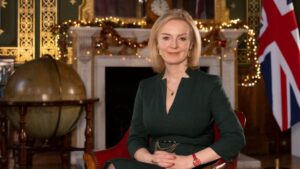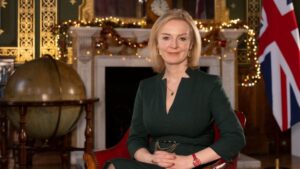
Boris Johnson has appointed Liz Truss, the foreign secretary, to oversee Brexit negotiations after the resignation of Lord Frost.
The foreign secretary will bolster her role in what is seen by allies as a “big consolidation of power” by becoming the UK’s lead negotiator.
Truss voted Remain but has since become a Brexit enthusiast, repeatedly suggesting that Britain should become less dependent on trade with the EU. In her roles as both trade secretary and foreign secretary she highlighted that fact that none of the fastest growing economies in the world were in Europe.
Chris Heaton-Harris, a Brexiteer, has been drafted in as minister for Europe and will deputise for her when she is unavailable for negotiations.
One ally of Truss suggested that it could significantly boost her leadership ambitions. “It just brings her back into the centre, it consolidates her power-base” they said. “It’s a big land grab. Her current view would be it’s a big world, don’t confine yourself to the EU. But she also sees the opportunities and doesn’t want a hostile relationship with the EU.”
Another ally said that she and Frost are “very close” and are “ideologically on the same page”. “She’s battle-hardened as trade secretary,” they said. “She is looking forward to getting stuck in. She feels the EU and Europe more broadly are important allies in facing down malign actors such as Russia. She wants to strengthen economic ties.”
Truss will take on ministerial responsibility for the UK’s relationship with the EU, becoming the co-chair of the partnership council and the joint committee.
The crisis engulfing Johnson’s premiership had deepened last night when Frost, an important Brexit ally, quit over concerns about a series of core policy decisions. Frost, who only a year ago celebrated Britain’s departure from the EU with the prime minister, will leave his post immediately. He is understood to have handed his resignation to the prime minister earlier this month, but was persuaded to stay on until January.
It is believed that the prime minister told Frost the government could not cope with a high-profile departure and asked him to delay the announcement. Last night, Frost formally tendered his resignation in a letter expressing concerns about the government’s “direction of travel.”
Lord Frost wrote: “You know my concerns about the current direction of travel. I hope we will move as fast as possible to where we need to get to: a lightly regulated, low-tax, entrepreneurial economy, at the cutting edge of modern science and economic change.
“Three hundred years of history show that countries which take that route grow and prosper, and I am confident we will too.”
Frost also expressed his concerns about the Covid-19 crisis after more than 100 Tories MPs rebelled against the government to protest against the introduction of “plan B” measures.
“We also need to learn to live with Covid and I know that is your instinct too,” he wrote. “You took a brave decision in July, against considerable opposition, to open up the country again. Sadly, it did not prove to be irreversible, as I wished, and believe you did too. I hope we can get back on track soon and not be tempted by the kind of coercive measures we have seen elsewhere.”
Allies say Frost is exasperated with the high-spending regime, the obsession with hitting “net zero” environmental targets and Covid vaccine passports. He is also said to be “battle weary” after negotiating with the European Union over the Northern Ireland protocol, the post-Brexit rules that prevent a hard border between Northern Ireland and the Republic.
Last night Johnson praised Frost for helping to “maximise the economic and political opportunities for Brexit.” The prime minister added in a letter to Frost: “You have helped highlight and sought to address the destabilising impact of the current operation of the Northern Ireland protocol is having on communities in Northern Ireland, which is undermining the Belfast (Good Friday) Agreement.”
After Frost’s resignation Nadine Dorries, the culture secretary, was removed from a Conservative WhatsApp group after defending the prime minister.
Tory MPs on the 100-strong Clean Global Brexit group voiced concerns about the resignation. Theresa Villiers, a former Northern Ireland secretary, said it was “very worrying”, while Andrew Bridgen, a Tory MP, called it a “disaster”. “Lord Frost was concerned about the direction of the Gov. So are most conservative backbenchers,” he said. Marcus Fysh, the Tory MP for Yeovil, called Frost a “hero” for his tough stance on Brexit and Sir Geoffrey Clifton-Brown, MP for the Cotswolds, said it was a “further hammer blow to the PM”.
Dorries then intervened saying: “The hero is the Prime Minister who delivered Brexit. I’m aware as someone said today that regicide is in the DNA of the Conservative Party, but a bit of loyalty to the person who won an 83-majority and delivered Brexit wouldn’t go amiss.”
Steve Baker, a former chairman of the Brexit backing European Research Group, removed her from the group. He said “enough is enough”, before posting a thumbs-up emoji of himself.
Conor Burns, a former minister and friend of Johnson, expressed his support for Dorries. “Absolutely right Nadine,” he said. “Memory seems to be very short”. Baker responded by highlighting that Johnson had ultimately backed May’s Brexit deal, which was rejected after a revolt by MPs. He also said that “someone” — inferring himself — had persuaded Nigel Farage not to run Brexit Party candidates against Tory Eurosceptics. “If Boris had not benefited from both, we would be on the other benches,” he said. “True story. And yes, Conor, some memories are indeed very short.
Frost’s departure came at the end of a terrible week for Johnson. There was a damaging backbench rebellion over pandemic regulations, a by-election defeat in a previously safe seat, more revelations about lockdown-breaking parties in Downing Street, and a fresh Covid crisis.
Frost dropped a heavy hint of his dissatisfaction with Johnson’s policies in a speech last month. In it, he expressed concern the government was not taking advantage of the freedom given by Brexit to chart a new political course, cutting taxes and reducing regulation.
“We can’t carry on as we were before,” he said. “And if after Brexit all we do is import the European social model, we will not succeed.”
Before the news of his departure broke, in The Mail on Sunday, it was already understood that Iain Duncan Smith was being lined up for a prominent job to placate the increasingly restive right wing of the Conservative Party.
It would be part of a wider reset of Johnson’s premiership.
There is no suggestion a leadership challenge will be mounted in the short term but insiders believe the week’s events have left the prime minister “fatally wounded”.
Baroness Chapman of Darlington, Labour’s shadow minister at the Cabinet Office, said: “The government is in chaos. The country needs leadership, not a lame duck PM who has lost the faith of his MPs and cabinet.
“Boris Johnson needs to get a grip, tell us his plan for the next few weeks and bring certainty for the people of Northern Ireland by unblocking the stalemate over the protocol.”
Yesterday the cabinet was in open revolt over coronavirus data from the government’s own scientists and advice to implement pre-Christmas restrictions to combat the spread of the Omicron variant.
Professor Chris Whitty, the chief medical officer for England, and Sir Patrick Vallance, the chief scientific adviser, briefed the cabinet yesterday that further measures were needed to stop hospital admissions in England reaching 3,000 a day. They believe any delay would allow cases of the new variant to continue doubling every two days, leading to close to a million infections a day by Christmas.
The advice was greeted with scepticism by cabinet ministers who fear the data is not yet reliable enough to justify restrictions that would in effect cancel Christmas.
The prime minister is understood to be opposed to imminent restrictions and believes the booster vaccination programme should “buy time”. His view was backed by a majority of cabinet ministers.
Grant Shapps, the transport secretary, was one of the most vocal opponents to further restrictions, citing data that showed there had not been a huge rise in deaths in South Africa, where the Omicron variant emerged.
One cabinet minister said: “We can’t have a situation where we lock down every winter and kill off the economy. We need to stop reading across what is happening in South Africa in terms of what is happening here. It is like comparing apples with pears.”
Rishi Sunak, the chancellor, is one of those opposed to more restrictions that could damage the economy. This weekend he is considering support including tax breaks for the retail and hospitality sectors after pubs and restaurants said their Christmas bookings had collapsed.
Across the UK, 90,418 new cases were reported yesterday, a slight fall on Friday’s figure but up 67 per cent in a week. It is thought that the number of infections is about twice as high, at closer to 200,000, and may be doubling every two days.
Newly released minutes from the government’s Scientific Advisory Group for Emergencies (Sage) said there could be a peak of 3,000 patients a day needing a hospital bed in England without action, and the longer the delay the more time the NHS would be under significant pressure. Figures show an average of 770 patients admitted per day, a rise of 8 per cent in a week.
The Sage minutes added: “If the aim is to reduce the levels of infection in the population and prevent hospitalisations reaching these levels, more stringent measures would need to be implemented very soon.”
Johnson’s hopes of relying on the booster programme to avoid new restrictions suffered a blow last night. A leaked NHS email said a national shortage of delivery vehicles could limit jabs being sent out next week.
It came as Sadiq Khan, the mayor of London, declared a major incident over the “huge surge” of Omicron cases in the capital, where there is a high number of unvaccinated people. The number of Covid-19 patients in London hospitals has gone up 29 per cent in a week.
It is understood that any further restrictions could be introduced between Christmas and the new year. Boxing Day has been pencilled in for an announcement, with the measures potentially starting on December 27.
One of the options being considered is understood to be a two-week circuit breaker, involving a return of the rule of six and no indoor mixing. Pubs and restaurants would only be allowed to serve customers outside.
However, the plans have yet to reach ministerial level and have not been signed off.
It is also understood that Sir Keir Starmer, the Labour leader, has not ruled out demanding fresh curbs.
The Liberal Democrats have called on the government to recall a virtual parliament over Covid policy.
Sir Lindsay Hoyle, the Speaker, has requested a meeting with the clerk of the House of Commons and Jacob Rees-Mogg, the leader of the House, to discuss whether MPs can return to parliament in the new year, perhaps remotely.
Read more:
Liz Truss to lead EU talks after PM’s key Brexit ally Lord Frost quits
